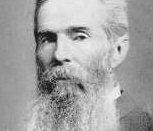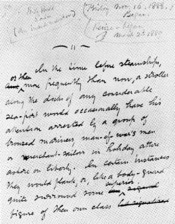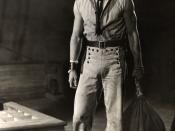Before the Fall, Adam and Eve were perfect. They were innocent and ignorant, yet perfect, so they were allowed to abide in the presence of God. Once they partook of the fruit of the Tree of Knowledge of Good and Evil, however, they immediately became unclean as well as mortal. In Billy Budd, the author, Herman Melville, presents a question that stems directly from this original sin of our first parents: Is it better to be innocent and ignorant, but good and righteous, or is it better to be experienced and knowledgeable? I believe that through this book, Melville is telling us that we need to strike some kind of balance between these two ideas; we need to have morality and virtue; we need to be in the world, but not of the world.
To illustrate his theme, Melville uses a few characters who are all very different, the most important of which is Billy Budd.
Billy is the focal point of the book and the single person whom we are meant to learn the most from. On the ship, the Rights-of-Man, Billy is a cynosure among his shipmates; a leader, not by authority, but by example. All the members of the crew look up to him and love him. He is 'strength and beauty. Tales of his prowess [are] recited. Ashore he [is] the champion, afloat the spokesman; on every suitable occasion always foremost'(9).
Despite his popularity among the crew and his hardworking attitude, Billy is transferred to another British ship, the Indomitable. And while he is accepted for his looks and happy personality, '...hardly here [is] he that cynosure he had previously been among those minor ship's companies of the merchant marine'(14). It is here, on the Indomitable that Billy says good-bye to his rights. It is...


